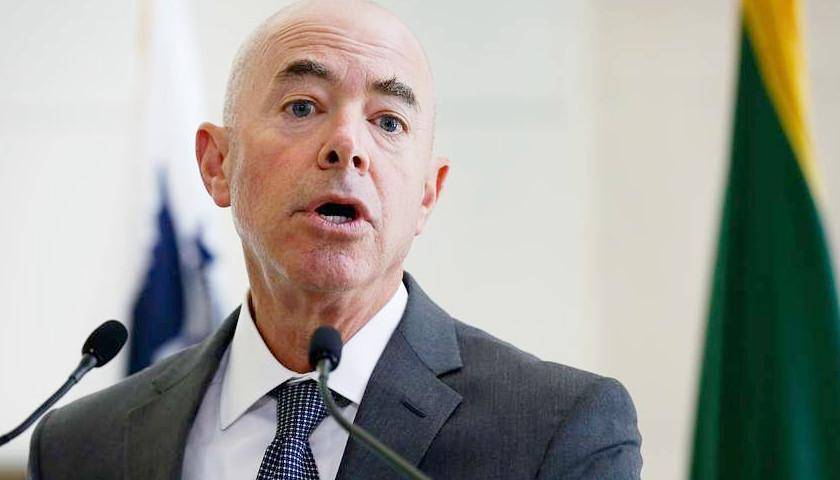by Bethany Blankley
The U.S. House Committee on Homeland Security will be holding a hearing next Tuesday to examine the Department of Homeland Security’s fiscal 2025 budget request.
It will hear testimony from DHS Secretary Alejandro Mayorkas, who is scheduled to testify for the first time since he was impeached in February. The committee’s chairman, U.S. Rep. Mark Green, R-Tenn., led the charge to impeach Mayorkas on two counts, making him the first sitting cabinet member to be impeached in U.S. history.
“Three years into this administration, the threats to the homeland are growing by the day, in many cases as a result of President [Joe] Biden and Secretary Mayorkas’ utter refusal to secure our borders,” Green said. “The crisis at our borders is not one of resources but one caused by Secretary Mayorkas’ clear refusal to enforce the law and his breach of the public trust. This historic chaos has exposed our country to grave security risks – from unprecedented cartel control of the Southwest border and the fentanyl epidemic to suspected terrorists being released into our communities.
“Meanwhile, the Chinese Communist Party continues to target sectors of our critical infrastructure with cyber intrusions, the Iranian regime and its ‘Axis of Resistance’ have been emboldened against Israel and its allies, and dissidents of both authoritarian regimes face threats and retaliation on U.S. soil. As a co-equal branch of government, we will continue conducting rigorous oversight over the executive branch to ensure DHS is accountable to American taxpayers and not only properly equipped with, but properly utilizing, the resources we give them to combat these threats.”
The budget has been a source of contention, with Mayorkas and Senate Democrats saying if the budget request isn’t approved it will lead to layoffs and less detention space, among other claims. Increasing DHS’s budget was a priority of a Senate border bill that sought to codify Mayorkas policies into law, some of the same policies for which he was impeached.
Republicans on Green’s committee have identified several aspects of Mayorkas’ fiscal 2025 budget requests as problematic.
Highlighted provisions include a $1.4 billion cut to U.S. Customs and Border Protection’s budget compared to the annualized amount in the fiscal 2024 continuing resolution. This includes cutting $250 million to CBP’s Border Security Operations budget.
It also includes a “$4.7 billion slush fund euphemistically called the ‘Southwest Border Contingency Fund,’” Green argues, which reallocates funds from CBP, Immigration and Customs Enforcement (ICE), and Federal Emergency Management Agency (FEMA) baseline budgets. Instead, the money would “go to facilitating the border crisis through funding processing centers and coordinators, illegal alien transportation,” among other programs, he says.
The budget proposal also requests only $7.1 million for the Southwest border wall system program.
By contrast, Texas has allocated roughly $3.1 billion toward expanding border barriers and infrastructure, including continuing to build Texas’ own border wall, The Center Square reported.
The DHS budget proposal also requests funding for 34,000 ICE detention beds, barely half of the 60,000 beds requested by the Trump administration in its fiscal 2021 budget, Green notes. In fiscal 2020, southwest border encounters totaled roughly 460,000. If the number of illegal border crossers continue at the current rate, they are on track to surpass 3.5 million illegal entries, the highest in U.S. history.
More than 11 million, including those who evaded capture known as gotaways, have illegally entered the country since January 2021, The Center Square reported.
Record numbers continued to pour through the border after Mayorkas implemented numerous parole programs identified as illegal by Republicans on the House Committee on Homeland Security, which Republicans argue led to unprecedented illegal entries, skyrocketing crime and a preventable and stoppable border crisis.
Mayorkas’ budget allocates enough funds to hire 350 new Border Patrol agents compared to House Republicans’ HR 2, the Secure the Border Act, which allocates enough to hire 3,000 Border Patrol agents. The budget also requests funding to hire 310 additional processing coordinators and 150 new CBP officers “to bolster situational awareness and operational responsiveness.”
It also asks for “zero dollars to restart widespread DNA testing of family units at the Southwest border, which is vital to eliminating asylum fraud and the cartels’ use of ‘fake families’ to smuggle individuals into the country—often exploiting unaccompanied children in the process,” Green argues.
DHS’s fiscal 2025 budget requests over $107.9 billion, of which $62.2 billion is net discretionary funding. It provides DHS “with resources to continue investment in critical capabilities and capacity needed to secure the homeland,” it states. It also argues the Southwest Border Contingency Fund “supports our Southwest border operations as conditions change there,” it says.
The largest share of the budget is allocated to FEMA (31%), followed by CBP (18%), U.S. Coast Guard (13%), Transportation Security Administration (11%), ICE (9%), U.S. Citizenship and Immigration Services (6%), other (5%), Management Directorate (4%), and Cybersecurity and Infrastructure Security Agency (3%).
– – –
Bethany Blankley is a contributor to The Center Square.




